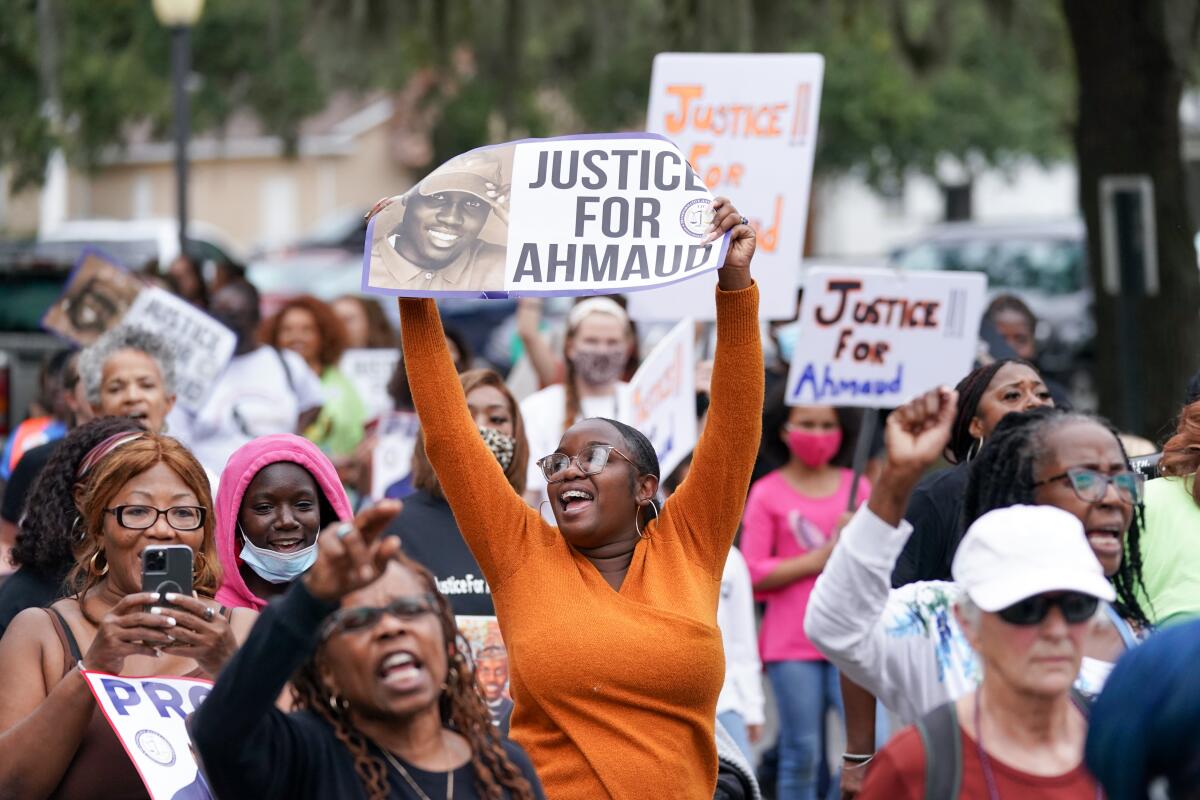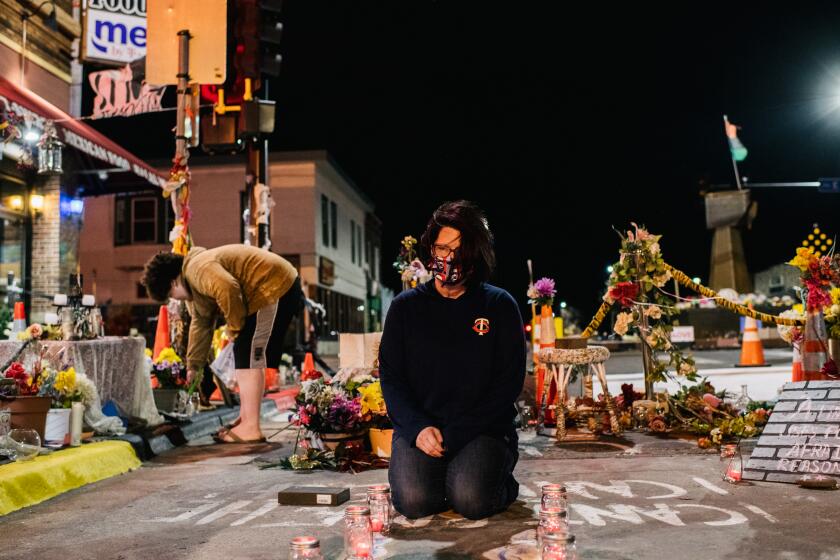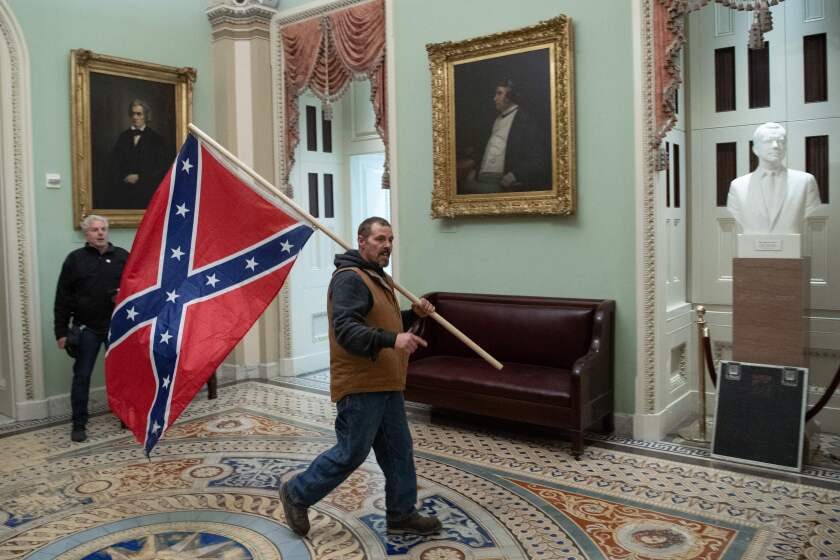Op-Ed: The non-victory victory in the Ahmaud Arbery case

I’m as relieved as anyone that the three men who hunted down and shot Ahmaud Arbery without provocation were found guilty of murder, but it’s hard to get too happy.
Justice was done — but isn’t this what was supposed to happen? We’ve been celebrating these verdicts as a victory, when they should be seen as merely the routine outcome of a trial in which the prosecution had evidence beyond a reasonable doubt to convict. And we’re celebrating this outcome because it’s an exception in a trial in which an accused killer is white — and loudly claiming self-defense — and the victim is Black. That fact is nothing to celebrate either.
Many people, including the victim’s family, see the prosecutor’s success as the fruit of a hard-fought battle to do the right thing legally for Ahmaud Arbery. It is. But it comes too late: Arbery is dead. Critical as the legal win is, it is also an admission that a tragedy like this — the fatal shooting of a Black man by white men who were determined to see him as a threat, and eminently shootable — should never have happened at all.
We have to remember, as Derek Chauvin’s trial unfolds, that courtrooms are another place where too many cases of murder of Black people go to die.
Over the last decade we’ve encountered too many tragedies in this vein; too few have even been recognized as such, let alone seen justice. And yet even if they had, if the deaths of Trayvon Martin and Eric Garner and Breonna Taylor and so many others had all been vindicated in court, it would have been progress chiefly because it established a baseline fact — Black lives matter. From there we could begin to make real progress: a country where these surreal confrontations between unarmed Black people and white people wielding deadly force would ultimately become the exception, not the rule.
The Arbery murder is exceptional not because what happened to him was unique but because it became a marquee case. Part of that was timing. Although the murder happened in February 2020, the damning facts didn’t emerge for many weeks, heightening long-simmering public indignation about Black deaths that exploded after the murder of George Floyd in May.
The other, terribly ironic reason for the high visibility of the Arbery shooting is the fact that one of his white pursuers, William “Roddie” Bryan Jr., filmed it — not to record wrongdoing, as we might expect cellphone video footage to do these days, but to record what he thought was a perfectly justified action. Had Bryan not provided such compelling evidence, it’s likely Arbery’s murder would never have been a case at all. Before the footage surfaced publicly, the district attorney in Brunswick County, Ga., where the murder happened, had decided against bringing charges. Arbery’s death would have instead become part of a litany of crimes and incidents of questionable force against Black people that the media miss or ignore, and we therefore don’t see. The favorable verdict in the trial in Brunswick, and in the trial of Derek Chauvin, who murdered Floyd, pales in comparison to all that hasn’t been captured on video, or by reporters, and publicized.
Because such trials and verdicts are rare, there is a tendency to seize on the Arbery verdicts as a symbol. People on both sides of our very deep political and racial divisions hold up the outcome as proof that we’re not entirely screwed up — and on the more progressive side, proof that there is more than a sliver of hope for change.
I see this more narrowly. Back in 2013, a suburban self-styled watchman in Florida stalked and killed 17-year-old Trayvon Martin essentially for being a Black man in a white space; the vigilante, George Zimmerman, was tried on murder changes and acquitted, even heroized.
In 2021, Black history and white history converged at the Capitol, and it was not a pretty coming together.
That launched the Black Lives Matter movement. Eight years later, white vigilantes have been convicted of murder, and if the convicted are being heroized, we are not hearing about it. I will grant that the verdicts at least draw a full circle, salving of a cosmic wound that’s been open a long time. But it is only one case, one salving. Much as I’d love to wave the “Never Again” banner, I can’t.
I realized this almost viscerally when I glanced out my window Wednesday, the day of the verdict, and saw a Black man running by. He was clearly a jogger; focused, in the way joggers are; wearing athletic gear; keeping an even pace. A perfectly ordinary sight, but my heart caught in my throat. I live in a predominantly Black neighborhood in a big city, not a white enclave in the South. But that didn’t curb the dread.
My reflexive fear for the running man — where was he going, who would see him, what would the police think? — doesn’t go away because Ahmaud Arbery got his day in court. In some ways, it feels more present than ever.
Erin Aubry Kaplan is a contributing writer to Opinion.
More to Read
A cure for the common opinion
Get thought-provoking perspectives with our weekly newsletter.
You may occasionally receive promotional content from the Los Angeles Times.












